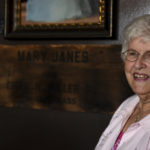Women do incredible things. This section features the stories of women who are a part of the Southeast Missouri community by way of living here, being from here or passing through. We hope these stories inspire you to connect with others and that they encourage you to be who you are in the world. We need you and your unique gifts.
This story was first published in the Oct. 13, 2020, edition of the Southeast Missourian newspaper. To hear Mitzie tell her story, reserve your complimentary ticket to the Survivor Stories event at 6 p.m. on Oct. 22, 2020, at One City in Cape Girardeau at survivorstories2020.eventbrite.com, or watch the livestream at facebook.com/rustmedia.
Mitzie Seger of Advance, Missouri, was at the gym one day working out. It was her normal routine. It was August 2018.
Except on this day, something wasn’t normal. She noticed discharge coming out of one of her breasts, an occurrence she’d been noticing during her past few visits to the gym. Always one to lead an active lifestyle, a couple of years earlier, she had dropped a bicycle on the same breast while she was putting it on a bike rack on her car, which had caused swelling. When Seger noticed the discharge at the gym, she asked her friend who was an OBGYN nurse if she should have it examined; her friend said yes.
So, she had a biopsy as protocol because the doctors didn’t think the discharge was anything to be concerned about. Seger was talking on the computer with her husband who was stationed in Afghanistan as a law enforcement professional contractor when she got the call.
“[The nurse] said, ‘We got your biopsy results back, and there’s a little cancer,’” Seger recalls. “I was such a smartass. I said, ‘Is that like being a little pregnant?’ She said, ‘Well, it’s early, but we need to decide what we’re going to do.’”
Seger had a double mastectomy because she didn’t want to have to worry throughout the rest of her life about cancer returning to her healthy breast. Then, she underwent three months of weekly chemotherapy followed by nine months of monthly chemo treatments. She decided to be treated locally because she felt the staff in Cape Girardeau cared about her, knowing her name and family background.
Staying positive, Seger says, was key. Although her immune system was vulnerable, her church reserved a seat for her in the back so she could continue attending Mass each week as the last one in and first one out. She developed a “grateful list” and says she became thankful for services like ATMs, pay-at-the-pump gas pumps and grocery pickup, which allowed her to live her life without being exposed to so many germs.
Of course, even amidst her positive attitude, there were challenges. The very worst day, she says, was when she lost her hair.
“I was mowing the yard just about three weeks into it, and I was looking behind me to see if I was making the track when you turn around, and the wind blew, and my hair blew off. Not all of it, but a lot of it, and I felt like God’s dandelion,” Seger says. “That was the day that I decided, ‘Okay, I’m going to go get it shaved.’ And of all the days, that was the worst day of any of it. Because it’s like an indicator when people see you bald — they know; there’s no hiding it.”
That was also the day she realized she had to find something to look forward to, so she scheduled a day in her planner when she would go back to the gym. That’s another piece of Seger’s advice to those dealing with cancer: plan something you can be excited about doing once you are finished with chemotherapy.
Consistency is another important factor in battling cancer, Seger says. Doing things to keep life simple such as taking the same route to chemotherapy treatments can be helpful. It also helps to take the same person with you to each of your doctor’s appointments so they can be a second set of ears and eyes and take notes.
“Live your life as stress-free as you can and know that there’s a bigger plan,” Seger says of the importance of consistency amidst what can’t be controlled. “Your faith in God has to carry you through this because even if you die, there’s a bigger plan.”
Surrounding one’s self with positive people is also important. And on the flip side, Seger says loved ones and acquaintances should be positive around cancer patients, talking with them about topics other than their illness. It’s also important to not feel sorry for people who have cancer; Seger says she hated when people looked at her with pity in their eyes.
She encourages people to be proactive about seeking early treatment and to not put off issues related to their health.
“When they say you’ve got cancer, you think it’s a death sentence. It’s not. It used to be. But it’s not now,” Seger says. “Early treatment is key. Get out there, let those people help you. That’s what they do. They want to, they want to help you.”
She hopes she can help by sharing her story, too.
“If I can help one person, it’s worth it,” she says.

